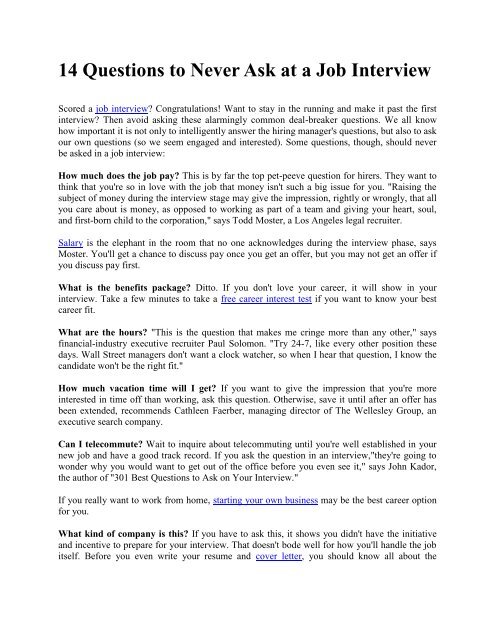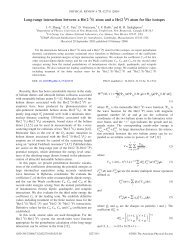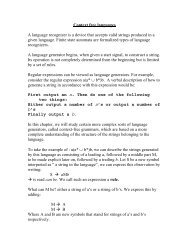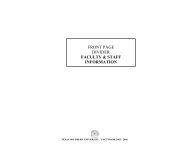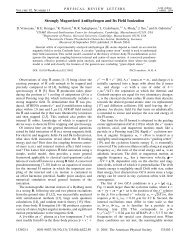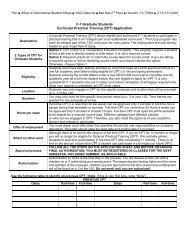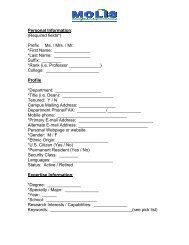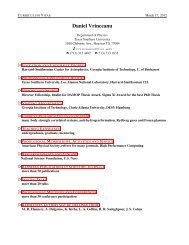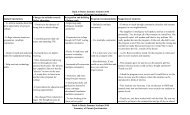14 Questions to Never Ask at a Job Interview
14 Questions to Never Ask at a Job Interview
14 Questions to Never Ask at a Job Interview
You also want an ePaper? Increase the reach of your titles
YUMPU automatically turns print PDFs into web optimized ePapers that Google loves.
<strong>14</strong> <strong>Questions</strong> <strong>to</strong> <strong>Never</strong> <strong>Ask</strong> <strong>at</strong> a <strong>Job</strong> <strong>Interview</strong><br />
Scored a job interview? Congr<strong>at</strong>ul<strong>at</strong>ions! Want <strong>to</strong> stay in the running and make it past the first<br />
interview? Then avoid asking these alarmingly common deal-breaker questions. We all know<br />
how important it is not only <strong>to</strong> intelligently answer the hiring manager's questions, but also <strong>to</strong> ask<br />
our own questions (so we seem engaged and interested). Some questions, though, should never<br />
be asked in a job interview:<br />
How much does the job pay? This is by far the <strong>to</strong>p pet-peeve question for hirers. They want <strong>to</strong><br />
think th<strong>at</strong> you're so in love with the job th<strong>at</strong> money isn't such a big issue for you. "Raising the<br />
subject of money during the interview stage may give the impression, rightly or wrongly, th<strong>at</strong> all<br />
you care about is money, as opposed <strong>to</strong> working as part of a team and giving your heart, soul,<br />
and first-born child <strong>to</strong> the corpor<strong>at</strong>ion," says Todd Moster, a Los Angeles legal recruiter.<br />
Salary is the elephant in the room th<strong>at</strong> no one acknowledges during the interview phase, says<br />
Moster. You'll get a chance <strong>to</strong> discuss pay once you get an offer, but you may not get an offer if<br />
you discuss pay first.<br />
Wh<strong>at</strong> is the benefits package? Dit<strong>to</strong>. If you don't love your career, it will show in your<br />
interview. Take a few minutes <strong>to</strong> take a free career interest test if you want <strong>to</strong> know your best<br />
career fit.<br />
Wh<strong>at</strong> are the hours? "This is the question th<strong>at</strong> makes me cringe more than any other," says<br />
financial-industry executive recruiter Paul Solomon. "Try 24-7, like every other position these<br />
days. Wall Street managers don't want a clock w<strong>at</strong>cher, so when I hear th<strong>at</strong> question, I know the<br />
candid<strong>at</strong>e won't be the right fit."<br />
How much vac<strong>at</strong>ion time will I get? If you want <strong>to</strong> give the impression th<strong>at</strong> you're more<br />
interested in time off than working, ask this question. Otherwise, save it until after an offer has<br />
been extended, recommends C<strong>at</strong>hleen Faerber, managing direc<strong>to</strong>r of The Wellesley Group, an<br />
executive search company.<br />
Can I telecommute? Wait <strong>to</strong> inquire about telecommuting until you're well established in your<br />
new job and have a good track record. If you ask the question in an interview,"they're going <strong>to</strong><br />
wonder why you would want <strong>to</strong> get out of the office before you even see it," says John Kador,<br />
the author of "301 Best <strong>Questions</strong> <strong>to</strong> <strong>Ask</strong> on Your <strong>Interview</strong>."<br />
If you really want <strong>to</strong> work from home, starting your own business may be the best career option<br />
for you.<br />
Wh<strong>at</strong> kind of company is this? If you have <strong>to</strong> ask this, it shows you didn't have the initi<strong>at</strong>ive<br />
and incentive <strong>to</strong> prepare for your interview. Th<strong>at</strong> doesn't bode well for how you'll handle the job<br />
itself. Before you even write your resume and cover letter, you should know all about the
company. "There's no excuse for going in<strong>to</strong> an interview unprepared and not being<br />
knowledgeable about the company," says career coach Cheryl Palmer.<br />
Cre<strong>at</strong>e a winning resume in minutes with a resume builder.<br />
Wh<strong>at</strong> happened <strong>to</strong> the last person who had this job? Of course you might be curious, but<br />
don't ask. "Wh<strong>at</strong>'s the difference? It's not your business <strong>to</strong> know," says career coach Michael<br />
Coritsidis. <strong>Ask</strong>ing will just make you look nosy.The same goes for questions th<strong>at</strong> probe in<strong>to</strong> the<br />
personal life of the interviewer, cautions Sharon Blaivas, president of Shake Up My Resume.<br />
You may be trying <strong>to</strong> be friendly, "but these may be sensitive areas and have nothing <strong>to</strong> do with<br />
the job," she says.<br />
Wh<strong>at</strong> do you like least about your employer? Sure, you may have heard dirt about the<br />
company, but an interview is not the place <strong>to</strong> bring it up."It will make you seem like you focus<br />
on neg<strong>at</strong>ives or don't think the company is representing itself correctly," says Richard Kirby, the<br />
author of "Fast Track Your <strong>Job</strong> Search." A little research will give you the scoop about whether<br />
this is a company you want <strong>to</strong> work for.<br />
How much help will I get? If there is a team, you'll be introduced <strong>to</strong> the members, says<br />
executive recruiter Bruce Hurwitz. "<strong>Ask</strong>ing about help gives the impression th<strong>at</strong> you can't do the<br />
job by your self and the company will have <strong>to</strong> do more hiring just <strong>to</strong> keep you," he says.<br />
strong>Can I work <strong>at</strong> another job part time? Employers want someone who is devoted <strong>to</strong>the<br />
company, not someone who could burn out by juggling <strong>to</strong>o much, says Robert Galinsky, founder<br />
of the New York Reality TV School.<br />
Do you do background checks? You like red flags? Wave the background-check question in<br />
front of the interviewer. "The hiring manager will start <strong>to</strong> wonder if they need <strong>to</strong> call security or<br />
if they're sitting across from a felon," says Adriana Llames, the author of "Career Sudoku: 9<br />
Ways <strong>to</strong> Win the <strong>Job</strong> Search Game."<br />
Wh<strong>at</strong> is your policy on drug use? Believe it or not, this isn't an uncommon question, says sales<br />
and leadership coach Dave Sheffield. "The funniest part of this question is th<strong>at</strong> the interviewee<br />
sees nothing wrong with it," he says.<br />
How did I do? Sure, you want <strong>to</strong> find out if you're a contender after an interview. "But asking<br />
th<strong>at</strong> question puts an interviewer on the spot, and they're rarely in a position <strong>to</strong> answer," says<br />
Frances Cole Jones, the author of "The Wow Fac<strong>to</strong>r." Plus, it makes you sound unprofessional.<br />
She suggests an effective altern<strong>at</strong>ive like, "So wh<strong>at</strong> are my next steps?"<br />
No questions: "By far the worst question is the one you never ask: Not asking any questions<br />
during an interview shows a lack of interest or comprehension, or can make you look desper<strong>at</strong>e,<br />
someone who will take any job under any circumstances," says motiv<strong>at</strong>ional speaker Barry<br />
M<strong>at</strong>her, the author of "Filling the Glass." "Nobody wants someone nobody wants."


